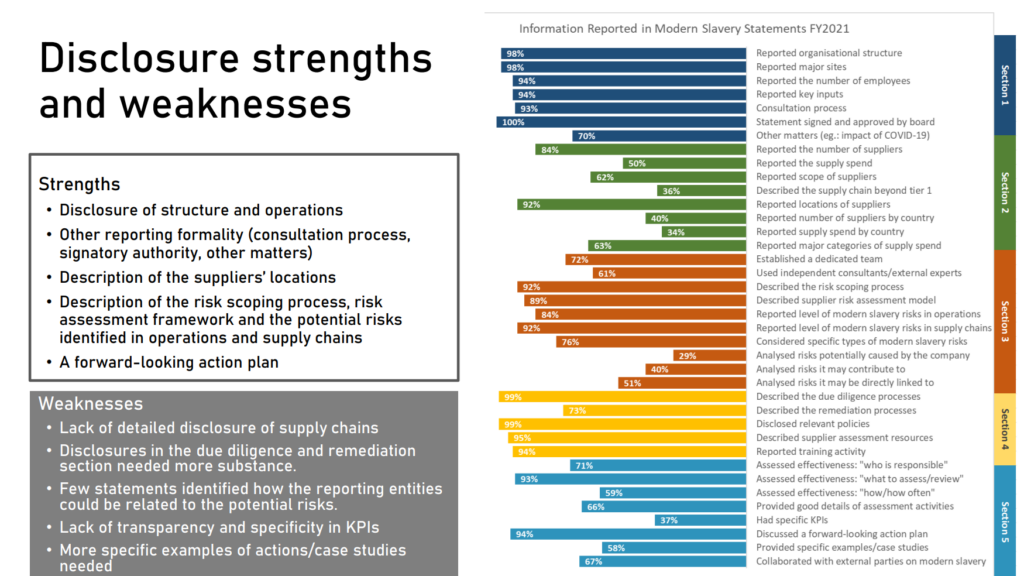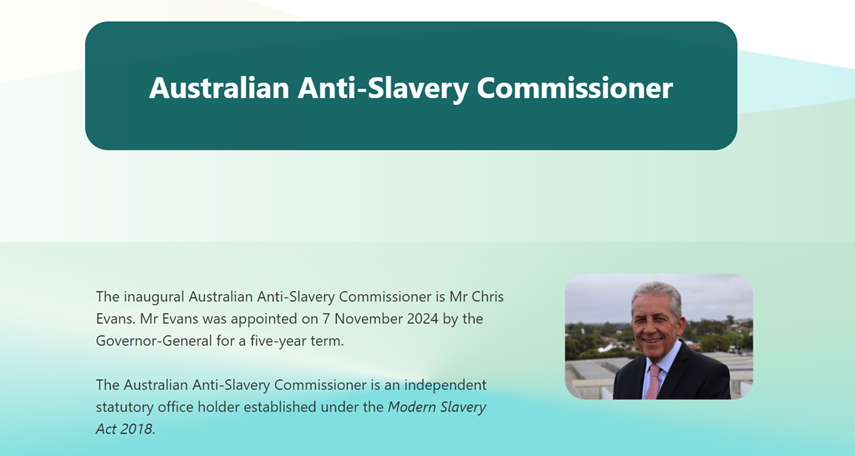Share this article
Global estimates of modern slavery are at 50 million, meaning nearly one in every 150 people in the world is in some form of forced labour or forced marriage. The International Labour Organisation estimates that in Australia there are 15,000 people in slave-like conditions. To address this, in 2018, Australia introduced the Modern Slavery Act 2018 (Cth) to combat modern slavery and human trafficking. Here we unpack what the Modern Slavery Act Australia is, who needs to report, statement requirements, quality reporting guidance, the Modern Slavery Act Review and how to comply with the Modern Slavery Act Australia.
What is the Modern Slavery Act Australia?
The Modern Slavery Act 2018 is a law in Australia that aims to combat modern slavery and human trafficking. The Act requires large businesses and other entities operating in Australia with a turnover of more than $100 million AUD, to report annually on the actions they have taken to address modern slavery risks in their operations and supply chains. The Act is intended to increase transparency and accountability in relation to modern slavery risks, and to encourage businesses to take action to address these risks and protect workers in their operations and supply chains.
The Act lists eight exploitations that are classified as modern slavery, including human trafficking, slavery, servitude, forced marriage, forced labour, debt bondage, deceptive recruitment and the worst forms of child labour, which involve slavery practices or hazardous work involving children.
Who must report to Australia’s Modern Slavery Act?
The Modern Slavery Act Australia applies to entities that have an annual consolidated revenue of at least AUD$100 million and that conduct any part of their business in Australia. These entities are required to prepare a slavery statement each financial year that complies with the reporting criteria presented in the Act.
Voluntary Modern Slavery Statements
Companies who do not meet the current revenue threshold may submit a voluntary modern slavery statement. A voluntary statement is often prepared by companies or organisations that want to demonstrate their commitment to addressing modern slavery and human trafficking risks in their operations and supply chains, even if they do not meet the revenue threshold or other criteria required by the legislation. A voluntary modern slavery statement must comply with the same criteria in the Act.
Voluntary statements can be a useful tool for companies and organisations to communicate their commitment to responsible business practices and to encourage transparency and accountability in relation to modern slavery risks. They can also help to build trust with stakeholders and consumers and differentiate the company or organisation from its competitors.
Voluntary statements are becoming more common as organisations mandated to report extend these requirements throughout their supply chain, seeking to better understand how suppliers are addressing modern slavery risks and to evaluate potential suppliers accordingly.
Modern Slavery Act Australia – how to comply
Under the Modern Slavery Act Australia, entities that meet the revenue threshold and operate in Australia are required to prepare a Modern Slavery Statement (MSS) each financial year. To comply with the Act, entities must include the following information:
- A description of the entity’s structure, operations, and supply chains, including information about the goods and services it provides and the countries in which it operates.
- A description of the entity’s modern slavery risks, including information about the specific types of slavery or trafficking that may occur in its operations or supply chains.
- A description of the actions the entity has taken to assess and address modern slavery risks in its operations and supply chains, including information about the due diligence processes it has undertaken, the policies and procedures it has implemented, and the training it has provided to its employees and business partners.
- A description of any actions the entity has taken to support the identification and protection of victims of modern slavery, and to prevent modern slavery from occurring in its operations and supply chains.
- A description of the performance indicators and targets used to measure the effectiveness of the entity’s actions to address modern slavery risks, and a summary of the results achieved.
- The name of the person or persons who is/are responsible for ensuring that the entity complies with the reporting requirements under the Act and the contact details of the person or persons.
- A statement that the information provided in the MSS is accurate and complete to the best of the person’s knowledge and belief.
The statement must be signed off by a director of the highest governing body and submitted to the Australian government for publication on a public registry.
For a more detailed explanation check out our article ‘How to Address Modern Slavery in your Organisation | Anthesis Australia
What is the annual Modern Slavery Act Australia reporting deadline?
Businesses are required to submit their modern slavery statement within six months of the end of their financial year. For example, if a company’s financial year ends on 31 December 2024, their modern slavery statement must be submitted by 30 June 2025. Similarly, if a company’s financial year ends on 30 June 2025, the statement should be submitted by 31 December 2025.
Modern Slavery Act guidance
Monash University publishes an annual research report reviewing modern slavery statements from the ASX 100, which is a good resource on what to do – and what not to do – for companies preparing or revising their statements. This report presents the results of Monash’s Modern Slavery Research program, breaking down disclosure strengths and weaknesses, quality of responses and areas for improvement and provides well-researched insights on how to improve the quality of the modern slavery statement.
Strong Modern Slavery statements address the following:
- Transparent disclosure of structure and operations
- Other reporting formality (consultation process, signatory authority, other matters)
- Detail of suppliers’ locations
- Detail of the risk scoping process, risk assessment framework and the potential risks identified in operations and supply chains
- A forward-looking action plan

The Modern Slavery Act Australia Review
A review of the Modern Slavery Act Australia was initiated in 2020, with final submissions closing in late 2022. The updates from the review were released December 2024, from 30 proposed recommendations including:
- introducing penalties for non-compliance with statutory reporting requirements
- lowering the reporting threshold from $100M to $50M
- requiring entities to report on modern slavery incidents or risks
- amending the Act to require entities have a due diligence system in place
- strengthening the administration of the Act through proposed legislative amendments and expanded administrative guidance; and
- proposing functions for the federal Anti-Slavery Commissioner in relation to the Act.
The review was informed by an extensive public consultation process involving over 280 government and non-government organisations, including from business, civil society and academia. 136 written submissions were provided to the review from a wide range of domestic and international stakeholders.
Modern Slavery Act – Government Response
to the Review
In December 2024 the Australian Government released its response to the review report of the
Modern Slavery Act 2018 (Cth). The Review made 30 recommendations, of which it fully agreed to 13, agreed in principle to 12, and noted five.
Key updates from the Government Review of the Modern Slavery Act include:
- Penalties: The Government has committed to consulting with stakeholders on introducing civil penalties for failing to produce a modern slavery statement, providing false information in one, or not complying with requests for remedial action.
- Due Diligence: The Government will consult on introducing a due diligence system, recognising it as a key tool to mitigate modern slavery and address human rights and environmental risks.
- Amended Reporting Criteria: Proposed additions include mandatory disclosure of identified risks, grievance mechanisms, and consultation efforts.
- Reporting Threshold: No changes to the $100M revenue threshold to $50M as per recommendations, but the Government will revisit this in future reviews.
- Complaints: Agreement to examining the practicability of establishing a procedure for the receipt and investigation of complaints from the public regarding entity reporting;
With potential penalties for non-compliance on the horizon, organisations must ensure they are fully meeting the current reporting requirements under the Modern Slavery Act. And while the government didn’t commit to implementing mandatory human rights due diligence, they did commit to running consultations on the matter, so organisations would do well to bring themselves up to global best practice standards regarding managing human rights risks in their supply chains.
These developments indicate a strengthened commitment to enhancing corporate responsibility and transparency in combating modern slavery.
Appointment of the Anti-Slavery Commissioner
As a result of the review, the government agreed to establish an Anti Slavery commissioner and appointed Mr. Chris Evans. This is an independent role aimed at strengthening the country’s efforts against modern slavery. The Commissioner will work with government, businesses, and civil society to improve compliance with the Modern Slavery Act 2018, enhance transparency in supply chains, and support victims.
The creation of an Anti Slavery commissioner has been welcomed by organisations such as the Law Council of Australia. “The Law Council has long advocated for an Australian Anti-Slavery Commissioner and therefore welcomes the passing of this Bill which establishes this important statutory office.” Law Council of Australia President, Mr Greg McIntyre.

Want to learn more about the Modern Slavery Act Australia reporting requirements or need guidance on your modern slavery statement?
We have a team of human rights leaders passionate about supporting organisations on their counter-modern slavery journeys. If you would like to learn more about our human rights services, get support with any of the above steps, or understand how we can help you address modern slavery or wider ESG topics in your business reach out to our team.
We’ve been technical experts and trusted advisors to some of Australia’s most well-known companies for over a decade, contact us to learn more or call +61 3 7035 1740.
Original article published 2022. Latest update published December 2024.

